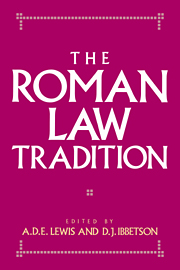Book contents
- Frontmatter
- Contents
- List of contributors
- Foreword: Peter Stein, Regius Professor of Civil Law in the University of Cambridge, 1968–1993
- List of abbreviations
- 1 The Roman law tradition
- 2 Labeo and the fraudulent slave
- 3 Doing and causing to be done
- 4 The danger of definition: contrectatio and appropriation
- 5 Going to the fair – Jacques de Révigny on possession
- 6 Bembo giureconsulto?
- 7 Gentilis and the interpretatio duplex
- 8 Ius gentium in the practice of the Court of Admiralty around 1600
- 9 Stair's title ‘Of Liberty and Servitude’
- 10 The actio communi dividundo in Roman and Scots law
- 11 Sale and transfer of title in Roman and Scots law
- 12 ‘What Marcellus says is against you’: Roman law and Common law
- 13 Audi et alteram partem: a limit to judicial activity
- Index of sources
- Index of names and subjects
1 - The Roman law tradition
Published online by Cambridge University Press: 08 October 2009
- Frontmatter
- Contents
- List of contributors
- Foreword: Peter Stein, Regius Professor of Civil Law in the University of Cambridge, 1968–1993
- List of abbreviations
- 1 The Roman law tradition
- 2 Labeo and the fraudulent slave
- 3 Doing and causing to be done
- 4 The danger of definition: contrectatio and appropriation
- 5 Going to the fair – Jacques de Révigny on possession
- 6 Bembo giureconsulto?
- 7 Gentilis and the interpretatio duplex
- 8 Ius gentium in the practice of the Court of Admiralty around 1600
- 9 Stair's title ‘Of Liberty and Servitude’
- 10 The actio communi dividundo in Roman and Scots law
- 11 Sale and transfer of title in Roman and Scots law
- 12 ‘What Marcellus says is against you’: Roman law and Common law
- 13 Audi et alteram partem: a limit to judicial activity
- Index of sources
- Index of names and subjects
Summary
Roman law was first the local law of a small central Italian city-state. As the political boundaries of that state expanded, so did its law, until by the early centuries of our era its influence was widespread over and beyond the Mediterranean basin. Important evidence revealing the application of Roman law at local level has recently been dug up in southern Spain; the Roman lawyer and administrator Papinian is said to have been at the northern British capital York assisting the Emperor in dispensing justice in AD 208; and papyri from Egypt and the Arabian desert indicate the extent of penetration of Roman legal notions even in areas of strong local traditions. Conveyances written on wood in Transylvania testify to a near-obsessive desire to comply with metropolitan standards.
The Roman legal tradition was characterised not so much by its substantive rules as by its intellectual methodology. Between about 100 BC and AD 250 the Roman jurists developed techniques of analogical and deductive reasoning which produced a jurisprudence of enormous refinement and sophistication. When the Emperor Justinian caused the substantial extracts from the writings of these classical jurists to be collected together in the early sixth century AD, he ensured the survival of their thought into subsequent ages. His Digest remains the finest monument of any legal culture.
As the political fortunes of the Roman state waned, so did its direct legal influences.
- Type
- Chapter
- Information
- The Roman Law Tradition , pp. 1 - 14Publisher: Cambridge University PressPrint publication year: 1994
- 4
- Cited by



